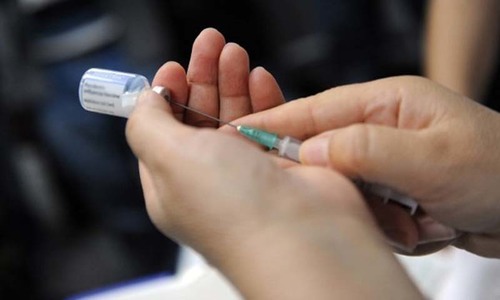ISLAMABAD: After a delay of about seven months, Pakistan has finally decided to implement the recommendations of the Independent Monitoring Board (IMB) on polio to eradicate the virus of the crippling disease for good.
The IMB’s 16th report, released in October 2018, stated that the Pakistan Polio Programme was fooling itself into thinking that it had made any progress at all since 2017 and suggested to eradicate the virus in the sewage because it (virus) could bounce back any time.
“Just after my appointment, I decided to implement the IMB report, but people sitting in the polio programme and some partners suggested not to do so as it may have political implications,” Prime Minister’s Focal Person on Polio Babar Bin Atta said while talking to Dawn.
“It is unfortunate that the number of reported polio cases for the current year has reached 21 as compared to 12 of the last year and only eight in 2017. Now the only option is to implement the report of the IMB,” he said.
Action has been delayed for seven months due to fear of political implications
The IMB works on behalf of the international donor agencies and issues reports regarding performance of the countries after every six months. In November 2012, the IMB recommended that travel restrictions should be imposed on Pakistani nationals and finally those recommendations were implemented on May 5, 2014. Because of those recommendations it is mandatory for every Pakistani to have polio drops before leaving for abroad.
The IMB’s 16th report, a copy of which is available with Dawn, stated that there were misconceptions within the leadership of the polio programmes in Pakistan and Afghanistan.
“One side seems to blame the other for their poliovirus. In Jalalabad, there have been comments that Pakistan sewage is depositing viruses in eastern Afghanistan. High-level people in the Pakistan government structure explain that all of their cases can be traced back to Afghanistan. Dangerously, this view, which is not based on reality, seems to be becoming contagious,” it stated.
“Despite Pakistan’s considerable progress since 2014, when the IMB declared its Polio Programme as a “disaster”, it is now clear that there is something seriously wrong with the Programme in Pakistan,” the report said. “The virology data show continuing transmission in key reservoirs, including Karachi, Quetta Block and Peshawar. This has not been fixed. This cannot be dismissed as some sort of glitch.”
The report warned that there was very low level of routine immunisation in different parts of the country and it could become reason of another outbreak of polio such as in Dukki, Balochistan, from where three polio cases were reported in 2018.
“With no valid data on actual vaccine coverage, and with widespread poliovirus in environmental samples, the question remains: how many more Dukkis are there waiting to happen in Pakistan? The Review Team reported a lack of visibility of senior politicians or government staff in Karachi. The communities see mainly foreigners, not their own people. Most of the time, the Deputy Commissioners are not visible walking the streets. This has undoubtedly heightened the public perception that polio is a “foreign” Programme,” the report said.
“The presence of senior politicians and government officials alongside partner staff would both inspire the community and polio workers as well as allow leadership to understand the Polio Programme’s weaknesses at first hand. Also, IMB sources report difficult relationships in Karachi. These issues have not been decisively resolved and will likely lead to further problems. It is not acceptable to have this in such a high priority area,” it stated.
Mr Atta said that just after his appointment, he had decided to remove all flaws highlighted by the IMB and implement all of its recommendations, but some of the personalities in the polio programme and partners had suggested remaining “mum” as otherwise it might have political implications.
“We cannot continue fooling us anymore as it would further increase the problem. Now we will implement the IMB recommendations in letter and spirit,” he said.
Published in Dawn, June 2nd, 2019













































